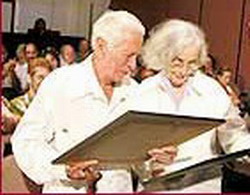Martí diverse and total
- Submitted by: admin
- Arts and Culture
- International
- Literature
- 10 / 16 / 2007

As Vitier clarifies, this text does not want - as the title could suggest - to be a biography, but "to show Martí as founder, actual and overabundant of future". It is curious that a person as Vitier, who has dedicated so many years and articles to the most varied topics of Martí, does not ends his notable effort with a biography. But when we go into the book, we understand that the author wanted to give us the man as a whole, not to offer a chain of chronological facts and contexts.
It is, then, a personal vision of the Master that wants to fill us with humanity in every sense of its historic expression as an individual. There it is the originality and the charm of the book, that inserts that way in the big work of Vitier as a writer and that expresses from its philosophical perspective about the history, society and human beings. The Christian humanism of servicing, the conception of poetry as an spiritual synthesis of the peoples and as a cognitive force and of spiritual transformation, the harmony as a maximum aspiration, love as a revolutionary energy are, perhaps, the supports of the judgment of Vitier in this particular rapprochement to Martí, in which he manages to get into his skin and in his soul, probably because, in a great extent, the author shares with him those perspectives. Then, we are in front of a book of Martí not only for its subject, but for its spiritual orientation and for that identification Vities has with Martí.
The expositive plan of the work is perfectly adjusted to that mission. The first chapter, Image of José Martí, is a brilliant essay about the essential lines that explain the exceptional personality, while the second chapter, Revolutionary Trajectory, follows the busy life of Marti in favor of the Cuban independence revolution, to create a new republic with continental and universal reach. The chapter it is not written with the details of an historian, but with the description and the analysis of the unavoidable moments of that action.
Then are coming, nine chapters, showing several aspects of the writing of Marti: oratory, poetry, novel, critic, journalism, science and education, newspapers and letters. The reader will not find in those chapters a literary critic, something usually exercised with unquestionable greatness by Vitier: it is an analysis to show the unity of the work of Martí, starting from its philosophical and social basis, the magnificence and creative originality of the word and the criteria of Martí and to show us about the reasons of Martí's enchanting power over the readers.
The book is as a sum of essays, joined together to give us a complete Martí, in which there is an emphasize in the chapters dedicated to the poetry, where Vitier shows it is not an exhausted topic, even though it is one of the most researched ones. It is also important the chapter dedicated to the letters, where the author gathers together brilliantly and newness, ideas, previously stated by him in other texts about the invaluable section of the criteria of Martí, ignored almost completely by the experts.
The book is supported by frequent quotes of the texts of Martí, used with illustrative rigor, with the indispensable good taste not to fatigue the reader, nor to affect the own speech of the author and even with the elegancy of establishing a kind of intimate and loving dialogue with the word of the Master.
Even now, Vitier surprises us with a new text in his octogenarian life. It is not quite probably that he can give us a new rapprochement to Martí, but this book is already the synthesis and the jubilant and thoughtful summary of his great experience in Martí that is enjoyable and grateful.
Source: Cubarte
Comments